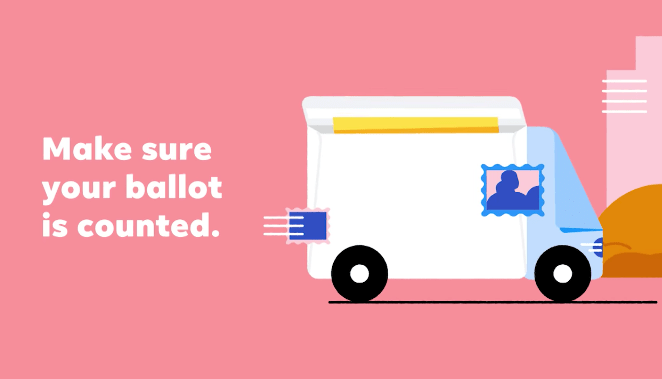Starting this weekend, everyone of voting age in the U.S. will begin seeing informational videos at the top of Instagram and Facebook, offering tips and state-specific guidance on how to vote through the mail. The videos will be offered in both English and Spanish.
The vote-by-mail videos will run on Facebook for four straight days in each state, starting between October 10 and October 18 depending on local registration deadlines. On Instagram, the videos will run in all 50 states on October 15 and October 16, followed by other notifications with vote-by-mail information over the next two days.

Image via Facebook

Image via Facebook
The videos let voters know when they can return a ballot in person, instruct them to sign carefully on additional envelopes that might be required and encourage returning ballots as soon as possible while being mindful of postmarking deadlines. Facebook will continue providing additional state-specific voting information in a voting information center dedicated to the 2020 election.
Even more than in past years, app makers have taken up the mantle of nudging their users to vote in the U.S. general election. From Snapchat to Credit Karma, it’s hard to open an app without being reminded to register — and that’s a good thing. Snapchat says it registered around 400,000 new voters through its own reminders and Facebook estimates that it helped 2.5 million people register to vote this year.
Voting rights advocates are concerned that 2020’s rapid scale-up of vote-by-mail might lead to many ballots being thrown out — a worry foreshadowed by the half a million ballots that were tossed out in state primaries. Some of those ballots failed to meet deadlines or were deemed invalid due to other mistakes voters made when filling them out.
In Florida, voters that were young, non-white or voting for the first time were twice as likely to have their ballots thrown out compared to white voters in the 2018 election, according to research by the ACLU.
Adding to concerns, state rules vary and they can be specific and confusing for voters new to voting through the mail. In Pennsylvania, the most likely state to decide the results of the 2020 election, new rules against “naked ballots” mean that any ballot not cast in an additional secrecy sleeve will be tossed out. In other states, secrecy sleeves have long been optional.
Facebook gets ready for November
Since 2016, Facebook has faced widespread criticism for rewarding hyper-partisan content, amplifying misinformation and incubating violent extremism. This week, the FBI revealed a plot to kidnap Michigan Governor Gretchen Whitmer that was hatched by militia groups who used the platform to organize.
Whether the public reveal of that months-long domestic terrorism investigation factored into its decisions or not, Facebook has taken a notably more aggressive posture across a handful of recent policy decisions. This week, the company expanded its ban on QAnon, the elaborate web of outlandish pro-Trump conspiracies that have increasingly spilled over into real-world violence, after that content had been allowed to thrive on the platform for years.
Facebook also just broadened its rules prohibiting voter intimidation to ban calls for poll watching that use militaristic language, like the Trump campaign’s own effort to recruit an “Army for Trump” to hold its political enemies to account on election day. The company also announced that it would suspend political advertising after election night, a policy that will likely remain in place until the results of the election are clear.
While President Trump has gone to great lengths to cast doubt on the integrity of vote-by-mail, mailed ballots are a historically very safe practice. States like Oregon and Colorado already conduct their voting through the mail in normal years, and all 50 states have absentee voting in place for people who can’t cast a ballot in person, whether they’re out of town or overseas serving in the military.


Recent Comments